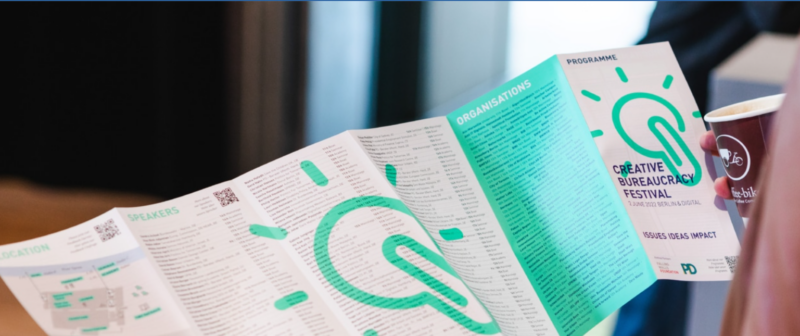Why We Need a Creative Bureaucracy Now

Share this
Pam Beddard interviews Charles Landry for Bristol Ideas about his work on creative bureaucracy. Bristol Ideas is hosting the first Creative Bureaucracy Day in the UK 23 April 2024.
Charles Landry is philosophical at the likelihood that those already interested in change will dominate the audience when Bristol Ideas hosts the first UK event to address why and how public administration needs to become more trusting, imaginative and flexible.
‘It’s inevitable,’ he says. ‘Persuading the unpersuaded is always a challenge. But this will be the first UK spin-off from the Berlin Festival, and we want people to leave the event believing that there is a movement in the making here.
If the dynamic is right, they will spread the message to those less interested at present that it is positive, empowering and gives administrators of all types more chances to make good things happen.’
His Berlin reference is to the annual Creative Bureaucracy Festival he co-founded – now in its seventh year and which last year featured more than 150 speakers from over 30 countries and attracted around 1,300 attendees with 1,000 more tuning in online.
It was set up as a continuation of Landry’s longtime work as a globally respected author, speaker and advisor who helps local, regional and national governments and others to make lives and places better. Central to his work is his championing of ‘creative bureaucracy’ as a means of attracting more investment, saving money, freeing up time and being more responsive to community wants and needs.
He concedes that the term “creative bureaucracy” he invented can come across as an oxymoron but says: ‘It’s a provocation – it suggests that not every bureaucrat is dull or an idiot but that very many people who have chosen to become public servants – in education, politics, planning, healthcare, social services and so on – are capable of having good fresh ideas’.
But what exactly is creative bureaucracy?
‘A snappier description is that it’s about changing from a “No, because…” to a “Yes, if…” culture.’
He accepts that there are obstacles to organisations of any kind making such changes: indifference, silo working, departmental rivalries, restrictive regulations, fear of failure, a conviction that the current mode of operation is fine.
But the Berlin Festival’s website gives many examples of how putting creative bureaucracy into practice is achieving positive results in cities and countries all over the world, among them places in mainland Europe, Latin America, Africa, south east Asia and Australia.
Pressed to name favourites, Landry settles on three:
- Finland’s adoption of Humble Governance – an acknowledgement that no-one can be sure in advance of how new policies will play out so allows key actors to begin exploring ways of solving urgent problems as soon as a thin consensus on common directions is reached, coupled with an acceptance that not all will work.
- South Australia’s use of 90-day action planning to tackle complex, multi-disciplinary, challenges – a NOW, WHERE, HOW framework, bringing together all those with a stake in a specific urgent issue to agree what the situation is at present; where it needs to be; and the steps needed to achieve effective progress within a three-month deadline. One result of the method’s use was that it revolutionised how the state handles incidents of domestic violence so that early warning signs, from health workers, schools, social services, police officers, communities and victims are shared, heeded and trigger quicker intervention.
- In Bologna, Italy, the establishment of an Office of Civic Imagination – exploring new ways of encouraging public engagement with a range of issues and making citizens feel heard.
He also likes it that Helsingborg in Sweden had an award that offered public servants the chance to compete for a €5,000 (£4,300) grant for failure – recognising that not all new ideas work but that trial and error can provide useful lessons.
Digital innovation figures strongly in the roster of Creative Business conference awards winners. These include one local authority’s switch to using AI to create some standard documents, so saving time and freeing staff for more person-to-person engagement.
But Charles Landry assures ‘Not everything about innovation is about the digital’. Sometimes pre-digital ways of working merit reviving or updating. For instance, Bilbao hugely reduced the time spent on expenses claim bureaucracy simply by upping the amount employees could spend without prior consent from €50 to €100.
So far, only one person in the UK has received a conference award – Geoff Mulgan, a former advisor to UK Government and former CEO of the UK’s innovation agency NESTA. Mulgan – now professor of Collective Intelligence, Social Innovation and Public Policy at University College London – will talk more about his experience in the Creative Bureaucracy event.
Charles Landry believes, though, that the time is right for Britain, and Bristol, to loosen up systems by marrying strategic democratically approved principals with tactical flexibility. For him, this allows administrative staff more freedom to make judgements, pursue more cross-disciplinary working and place more trust in the people who have chosen to become servants of the public.
‘The fact is,’ he warns, ‘remaining rigidly hierarchical doesn’t get the best of people and if we want to tackle the many problems we face, including environmental issues and social division, doing what we’ve always done won’t get us where we need to be to secure a better future.’
Charles Landry is a keynote speaker at the Bristol Ideas event Tuesday 23 April: Reimagining Public Administration: The Creative Bureaucracy Day. Tickets are on sale now. For more information and tickets, go here. Read Charles Landry’s book here.